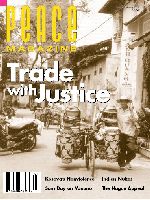
Peace Magazine Jan-Feb 1998, page 20. Some rights reserved.
Search for other articles by Timothy Donais here
Rather than opposing every new trade deal, activists should be fighting for social clauses to be embedded within these agreements
In spite of their best efforts, the leaders of the 18-member Asia Pacific Economic Cooperation (APEC) forum couldn't keep human rights issues completely off the agenda of their recent Vancouver summit. From the pepper-sprayed University of British Columbia student protesters to the case of jailed Indonesian labor activist Muchtar Pakpahan, human rights were the uninvited and slightly embarrassing guests that the APEC summiteers seemed to wish would just go away.
Speaking at the University of Toronto as APEC leaders were leaving Vancouver, former federal NDP leader Ed Broadbent, who is also ex-president of Canada's International Centre for Human Rights and Democratic Development, suggested that it is perhaps time that business and government leaders and rights activists stopped simply talking past each other on human rights issues. Economic globalization and trade liberalization are realities, Broadbent said, and rather than attempting to roll back the inevitable, those concerned with the global promotion of human rights should be working to ensure that global trade agreements contain the strongest possible human rights protections.
Currently, Broadbent noted, the only rights on the agenda of most multilateral trade forums are those of corporations. From the current focus on intellectual property rights to the ongoing talks around the Multilateral Agreement on Investment, focused primarily on the rights of foreign corporations within domestic markets, the new rights activists are the multinational corporations themselves. And while such agreements are aimed at "solidifying a limited set of commercial rights, very important to transnational corporations' capacity to move at will throughout the planet," said Broadbent, "human rights continue to be precarious."
Broadbent, who now teaches at Vancouver's Simon Fraser University, scoffed at the argument made by many Canadian business leaders and politicians that liberalized trade will by itself lead to democracy and greater respect for human rights in industrializing states. While capitalism can create positive pressure for democratization, the argument that economic growth has a straightforward cause-and-effect relationship with democracy is not only false, he suggested, but absurd. In fact, "nowhere are human rights more precarious than in many of the most important members of APEC." And while there is no doubt who has benefited most from economic globalization -- the majority of the 100 largest economies in the world today are not sovereign states but transnational corporations -- the benefits of globalization have not trickled down to the ordinary men and women who form the backbone of the global economy.
No one proves this point more than Muchtar Pakpahan, jailed on charges of subversion in Indonesia for his efforts to organize an independent trade union. Pakpahan, who remains behind bars and is seriously ill, became well-known during the APEC summit after Indonesian authorities reluctantly agreed to allow him to be treated by a Canadian doctor. Similarly, Broadbent counted among the victims of globalization the 188 Thai workers -- most of them women -- who perished in a Bangkok toy factory fire in May 1993, after having been locked inside by their employers.
Such cases, Broadbent suggested, point clearly to the need for strong and enforceable social clauses to be built into global trade agreements, in order to ensure that workers' rights are protected along with those of corporations. "If member states can take on obligations to ensure that the interests of corporations are internationally protected, then they owe it to those who work for those corporations to provide them with comparable protection." Such a social clause -- which would include a minimal core of basic rights such as freedom of association and the right of individuals not to be forced to work against their will -- should be entrenched within the agreement
of the World Trade Organization, he said. Unlike conventions of the International Labor Organization, which rely on the voluntary compliance of states, Broadbent suggested that countries take trade agreements seriously. And since, as Canadian trade analyst Michael Hart has argued, the WTO agreement contains "the most advanced set of rules capable of being enforced among the community of nations," successful efforts to insert a social clause into the agreement might provide workers with real rights that can be protected and enforced.
Not even Broadbent, however, would suggest that inserting strong and enforceable social clauses into multilateral trade agreements will be easy. Part of the problem is that the very notion of human rights is still contested in many parts of the globe. Particularly within the political leadership of APEC member states such as China, Singapore, Malaysia and Indonesia, universal human rights are considered to be subordinate to a unique set of "Asian values," which prioritize stability, order and community over individual rights and freedoms. Such arguments, Broadbent contended, have a deceptive but superficial appeal. As U.N. member states, all national governments are bound by the principles of the Universal Declaration of Human Rights, as well as the principles of the Vienna Declaration, adopted at the 1993 World Conference on Human Rights. Both documents affirm the universality and indivisibility of human rights principles. At the same time, Asian non-governmental organizations have defended the notion of universal human rights, rejecting the "Asian values" argument as a self-serving attempt on the part of their leaders to protect their political privileges.
Nevertheless, as the recent APEC forum underlined, international forums such as APEC are still primarily about business, not about human rights. And as long as the governments who sign trade agreements continue to treat human rights as a minor irritant at the margins of the trade agenda, putting corporate and human rights on an equal footing may prove an elusive and frustrating goal.
Timothy Donais is an associate editor of Peace Magazine.

Peace Magazine Jan-Feb 1998, page 20. Some rights reserved.
Search for other articles by Timothy Donais here